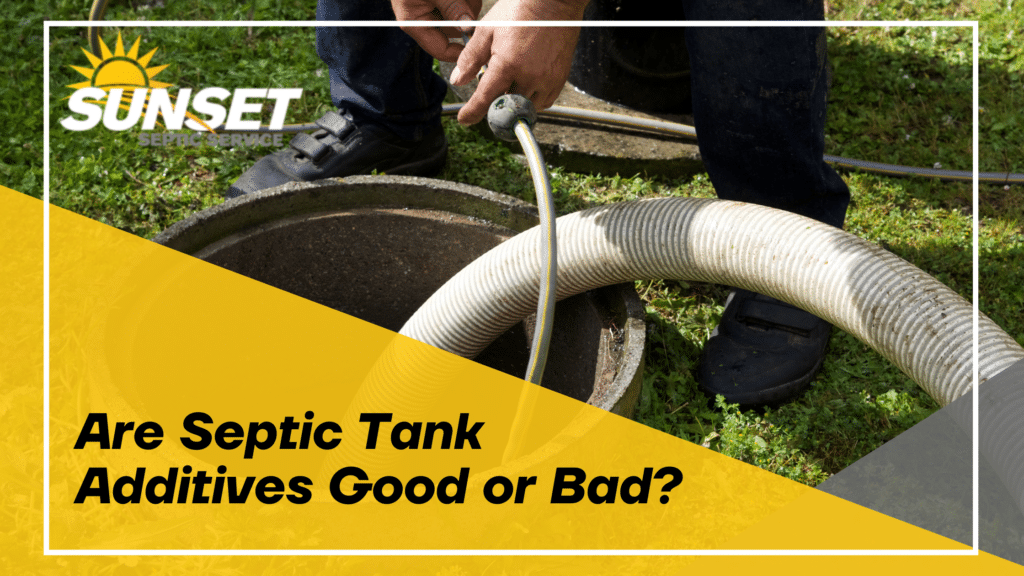Homeownership is a major life milestone, a cause for celebration and pride. With all the perks of owning your home comes the responsibility of maintaining it. Whether you’re a first-time homeowner just learning the ropes or a seasoned veteran looking for ways to better protect critical infrastructure, learning how to manage your septic system effectively is vital. Such a big responsibility is understandably daunting, so many homeowners consider using septic tank additives to improve performance and protect their systems. But are these additives doing more harm than good?
What Are Septic Tank Additives?
Even though it may seem like there are a million different additives claiming to be the best for protecting your system, there are three main additive categories: biological additives, inorganic compounds, and organic solvents. These additives are marketed to improve efficiency, reduce odors, and decrease sludge buildup.
- Biological Additives: Biological septic tank additives include bacteria, enzymes, and yeasts with the aim of enhancing the natural bacterial processes that happen in your septic tank. They claim to break waste down more effectively, and bacteria are essential for septic system operation. The truth is, though, that healthy septic systems already contain the necessary bacteria to get the job done. Adding more can actually disrupt the natural balance, which only creates new problems. Biological additives can be helpful for systems that have been compromised by chemicals or other contaminants but aren’t necessary in most situations.
- Inorganic Compounds: Inorganic additives are comprised of acids and alkalis meant to unclog pipes and aid in the breakdown of waste. While they can be effective in these areas, they can also be harsh enough to corrode your septic tank, completely disrupt the anaerobic digestion process, and harm beneficial bacteria. Rather than helping your system, in the long run, these additives can actually lead to leaks and an overall reduction in septic system efficiency.
- Organic Solvents: Fats, oils, and grease can wreak havoc on a septic system. Unfortunately, it can also be challenging to prevent them from sliding right down the drain occasionally. Organic solvents are intended to dissolve grease, fats, and oils, and they’re effective in that capacity. Unfortunately, they’re so powerful they can kill off the essential bacteria in your tank and upset the critical balance to the detriment of your system’s health. Their potential for harm isn’t restricted to your septic system, either. They can even contaminate the groundwater, which poses a general environmental risk that becomes even more vital if your water supply is a well on your property.
What the Science Says About Septic Tank Additives
There’s no shortage of studies on septic tank additives and their effectiveness. The U.S. Environmental Protection Agency also indicates that additives don’t significantly enhance the function of a septic system. They also don’t replace the need for regular maintenance and pumping. Additive manufacturer claims to the contrary are misleading. Using them will not prevent sludge accumulation, which is inevitable. It can’t be dissolved by any additives and has to be manually removed.
In Wisconsin, local regulations require septic systems to be inspected and pumped regardless of additive use.
Practical Tips for Septic System Maintenance
- Regular Inspections: Ensure your septic system is inspected every three years as Wisconsin state law requires.
- Conserve Water: Minimize water usage to prevent system overload.
- Proper Disposal: Avoid flushing non-biodegradable items and chemicals.
- Use Septic-Safe Products: Opt for cleaning products safe for septic systems to maintain bacterial balance.
- Scheduled Pumping: Regularly pump your septic tank to remove sludge and prevent system failure.
Keeping Your Septic System Worry-Free, No Additives Required
Even though septic tank additives are marketed as a convenient and easy solution, they’re almost always unnecessary for a healthy system and can sometimes do more harm than good. The best way to ensure your septic system operates efficiently, effectively, and safely is to invest in regular maintenance, inspections, and pumping.
Do you have questions about your septic system? Contact Sunset Septic today for expert advice and service to keep your system in peak condition.




